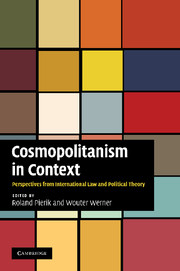Book contents
- Frontmatter
- Contents
- 1 Cosmopolitanism in context: an introduction
- Part I Environmental protection
- Part II World Trade Organization
- Part III Collective security and intervention
- 6 Cosmopolitan legitimacy and UN collective security
- 7 Enforcing cosmopolitan justice: the problem of intervention
- Part IV International Criminal Court
- Part V International migration
- Part VI Conclusion
- Index
- References
6 - Cosmopolitan legitimacy and UN collective security
Published online by Cambridge University Press: 06 December 2010
- Frontmatter
- Contents
- 1 Cosmopolitanism in context: an introduction
- Part I Environmental protection
- Part II World Trade Organization
- Part III Collective security and intervention
- 6 Cosmopolitan legitimacy and UN collective security
- 7 Enforcing cosmopolitan justice: the problem of intervention
- Part IV International Criminal Court
- Part V International migration
- Part VI Conclusion
- Index
- References
Summary
Introduction
Legitimacy is a desired property of political orders because it generates compliance by justifying and disciplining the exercise of power. More specifically, legitimacy prescribes the substantive and procedural conditions to which power should ascribe in order to be accepted by those over whom it is exercised. Although legitimacy is associated with state orders, it has become increasingly important in the context of international organizations (IOs) due to the expansion of their powers which nowadays reach states as well as individuals. That having been said, legitimacy is a multifaceted concept whose study is even more complicated in the case of international organizations because of their idiosyncratic nature: IOs may be independent and autonomous actors but, on the other hand, they are derivative and composite entities created by states and consisting mainly of states. Furthermore, IOs exist and operate in the international society whose other subjects are the same states that constitute IOs and with whom IOs compete for the same goods, such as peace, human rights, or development. As a result, questions are raised about the standards that inform judgments on the legitimacy of IOs as well as about the stakeholders of their legitimacy. Such questions are even more intense in the case of the United Nations (UN) because of its universal membership and aims.
Any study of the legitimacy of IOs is also complicated by the fact that legitimacy is not a fixed quality but is subject to a continuous process of change and adaptation in response to external or internal changes or events.
Information
- Type
- Chapter
- Information
- Cosmopolitanism in ContextPerspectives from International Law and Political Theory, pp. 129 - 154Publisher: Cambridge University PressPrint publication year: 2010
